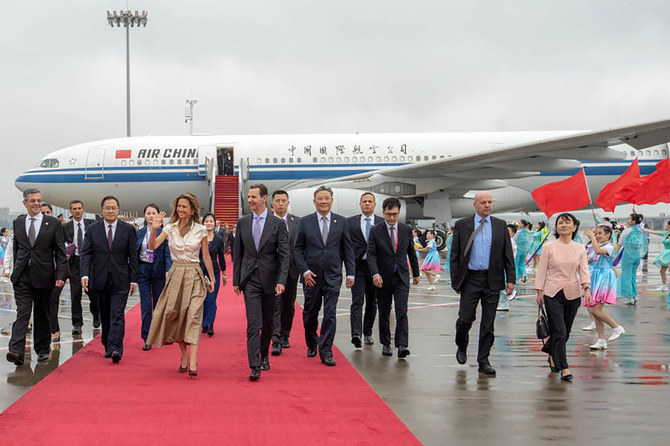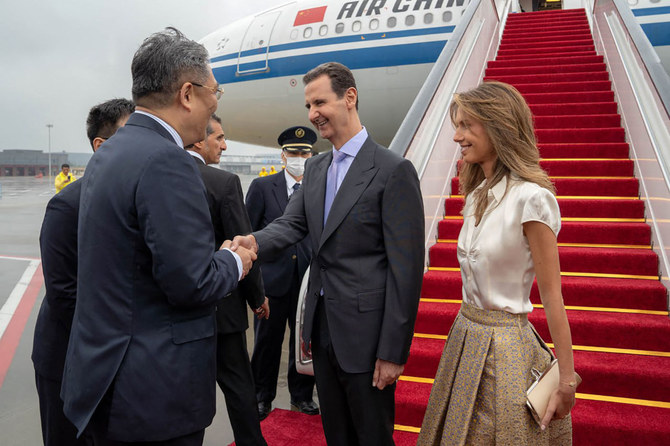JEDDAH: Syrian President Bashar Assad on Thursday began his first visit to China since 2004 and his latest attempt to end more than a decade of diplomatic isolation under Western sanctions.
Assad arrived in the eastern Chinese city of Hangzhou aboard an Air China plane in heavy fog, which Chinese state media said “added to the atmosphere of mystery.” Assad last visited China in 2004 to meet then-President Hu Jintao. It was the first visit by a Syrian head of state to China since the countries established diplomatic ties in 1956.
China — like Syria’s main allies Russia and Iran — maintained those ties even as other countries isolated Assad over his brutal crackdown of anti-government demonstrations that erupted in 2011, leading to a civil war that has killed more than half a million people, displaced millions more, and battered Syria’s infrastructure and industry.
Assad will attend Saturday’s Asian Games opening ceremony before leading a delegation in meetings in several Chinese cities.
He meets President Xi Jinping on Friday.

Syrian President Bashar al-Assad meeting with Chinese Premier Wen Jiabao in Beijing on June 23, 2004. He was the first Syrian head of state to visit China since the two countries established diplomatic relations in 1956. (AFP Photo/File)
Being seen with China’s president at a regional gathering adds further legitimacy to Assad’s campaign to return to the world stage.
Syria joined China’s Belt and Road Initiative in 2022 and was welcomed back into the Arab League in May.
Faced with a crippled economy and little to show so far from his efforts to rebuild ties with Arab states, Assad is keen for financial support.
But any Chinese or other investment in Syria risks entangling an investor in US sanctions under the 2020 Caesar Act that can freeze assets of anyone dealing with Syria.
“In his third term, Xi Jinping is seeking to openly challenge the US, so I don’t think it’s a surprise that he is willing to … host a leader like Assad,” said Alfred Wu, an associate professor at Lee Kuan Yew School of Public Policy in Singapore.
“It will further marginalize China in the world, but he doesn’t care about that.”
The visit comes as China expands its engagement in the Middle East.
This year Beijing brokered a deal restoring ties between Saudi Arabia and Iran.
That detente was followed by Syria’s return to the Arab fold at a summit in Saudi Arabia in May, ending more than a decade of regional isolation.
Analysts expect Assad’s visit to China will focus, in part, on funds for reconstruction.
“Assad intends for his trip to China to convey a sense of international legitimacy for his regime and paint a picture of looming Chinese support for reconstruction in Syria,” said Lina Khatib, director of the Middle East Institute at SOAS university in London.
Syria signed up to China’s vast Belt and Road trade and infrastructure initiative in January 2022.
Assad’s meeting with Xi “is expected to revolve around convincing China to aid Syria’s economic recovery,” said Haid Haid, of the Chatham House think tank in London.
China pledged $2 billion in investments in Syria in 2017, but Haid said the funds had “yet to materialize.”
(With Agencies)





























